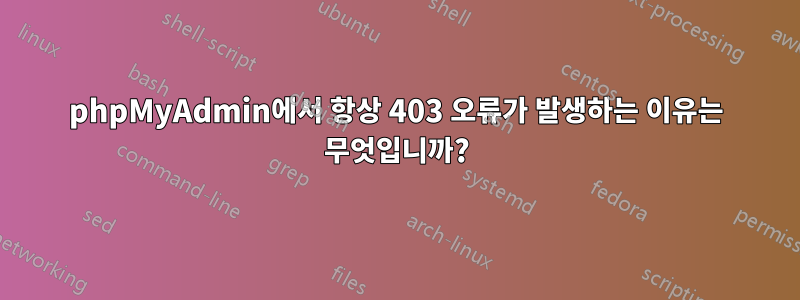
저는 Ubuntu 14.04 LTS 서버를 실행 중이고 phpMyAdmin을 작동시키려고 합니다. 열 때마다 192.168.0.xxx/phpmyadmin403 오류가 발생합니다. 또한 Wordpress가 설치되어 있어 아무런 문제 없이 액세스할 수 있습니다.
난 노력 했어:
- 소유권을 Apache로 설정
- 내 컴퓨터/서버 다시 시작
- 다른 컴퓨터를 사용했습니다
- 제거/재설치했습니다(
uninstall→install,purge→install및 포함install --reinstall). - 읽기많은이 문제를 해결하는 방법에 대한 튜토리얼/AU 질문/게시물/블로그 중 어느 것도 나에게 유효한 해결책을 보여주지 못했습니다.
사이트의 "홈페이지"를 볼 때 발견한 이상한 점 중 하나는(예: /foobar끝에 없음) 파일 탐색기가 표시된다는 것입니다. 그러나 phpMyAdmin은 표시되지 않습니다. 또한 며칠 전에 작동 중이었는데 아무것도 변경한 기억이 없습니다. 이것에 대해 이상해 보이는 유일한 점은 일반적으로 /servIIRC에 뭔가가 있다는 것입니다. 그러나 그것은 다른 서버에서 내가 가졌던 방식이었을 수도 있습니다...
.htaccess참고: 폴더 에 파일이 없습니다 /usr/share/phpmyadmin. 하나가 있어야 한다고 암시하는 기사를 본 적이 있지만 명확한 답을 찾을 수 없습니다.
/etc/phpmyadmin/apache.conf 파일:
# phpMyAdmin default Apache configuration
Alias /phpmyadmin /usr/share/phpmyadmin
<Directory /usr/share/phpmyadmin>
Options FollowSymLinks
DirectoryIndex index.php
order deny,allow
#deny from all
allow from all
<IfModule mod_php5.c>
AddType application/x-httpd-php .php
php_flag magic_quotes_gpc Off
php_flag track_vars On
php_flag register_globals Off
php_value include_path .
</IfModule>
</Directory>
# Authorize for setup
<Directory /usr/share/phpmyadmin/setup>
<IfModule mod_authn_file.c>
AuthType Basic
AuthName "phpMyAdmin Setup"
AuthUserFile /etc/phpmyadmin/htpasswd.setup
</IfModule>
Require valid-user
</Directory>
#Disallow web access to directories that don't need it
<Directory /usr/share/phpmyadmin/libraries>
Order Deny,Allow
Deny from All
</Directory>
<Directory /usr/share/phpmyadmin/setup/lib>
Order Deny,Allow
Deny from All
</Directory>
아파치 구성 파일:
# The accept serialization lock file MUST BE STORED ON A LOCAL DISK.
#
Mutex file:${APACHE_LOCK_DIR} default
# PidFile: The file in which the server should record its process
# identification number when it starts.
# This needs to be set in /etc/apache2/envvars
#
PidFile ${APACHE_PID_FILE}
# Timeout: The number of seconds before receives and sends time out.
#
Timeout 300
KeepAlive On
# MaxKeepAliveRequests: The maximum number of requests to allow
# during a persistent connection. Set to 0 to allow an unlimited amount.
# We recommend you leave this number high, for maximum performance.
#
MaxKeepAliveRequests 100
# KeepAliveTimeout: Number of seconds to wait for the next request from the
# same client on the same connection.
#
KeepAliveTimeout 5
# These need to be set in /etc/apache2/envvars
User ${APACHE_RUN_USER}
Group ${APACHE_RUN_GROUP}
# HostnameLookups
HostnameLookups Off
# ErrorLog: The location of the error log file.
ErrorLog ${APACHE_LOG_DIR}/error.log
# LogLevel: Control the severity of messages logged to the error_log.
# Available values: trace8, ..., trace1, debug, info, notice, warn,
# error, crit, alert, emerg.
# It is also possible to configure the log level for particular modules, e.g.
# "LogLevel info ssl:warn"
#
LogLevel warn
# Include module configuration:
IncludeOptional mods-enabled/*.load
IncludeOptional mods-enabled/*.conf
# Include list of ports to listen on
Include ports.conf
# Sets the default security model of the Apache2 HTTPD server. It does
# not allow access to the root filesystem outside of /usr/share and /var/www.
# The former is used by web applications packaged in Debian,
# the latter may be used for local directories served by the web server. If
# your system is serving content from a sub-directory in /srv you must allow
# access here, or in any related virtual host.
<Directory />
Options FollowSymLinks
AllowOverride None
Require all denied
</Directory>
<Directory /var/www/>
Options Indexes FollowSymLinks
AllowOverride All
Require all granted
</Directory>
# AccessFileName: The name of the file to look for in each directory
# for additional configuration directives. See also the AllowOverride
# directive.
#
AccessFileName .htaccess
# The following lines prevent .htaccess and .htpasswd files from being
# viewed by Web clients.
#
<FilesMatch "^\.ht">
Require all denied
</FilesMatch>
# The following directives define some format nicknames for use with
# a CustomLog directive.
#
# These deviate from the Common Log Format definitions in that they use %O
# (the actual bytes sent including headers) instead of %b (the size of the
# requested file), because the latter makes it impossible to detect partial
# requests.
#
# Note that the use of %{X-Forwarded-For}i instead of %h is not recommended.
# Use mod_remoteip instead.
#
LogFormat "%v:%p %h %l %u %t \"%r\" %>s %O \"%{Referer}i\" \"%{User-Agent}i\"" vhost_combined
LogFormat "%h %l %u %t \"%r\" %>s %O \"%{Referer}i\" \"%{User-Agent}i\"" combined
LogFormat "%h %l %u %t \"%r\" %>s %O" common
LogFormat "%{Referer}i -> %U" referer
LogFormat "%{User-agent}i" agent
# Include of directories ignores editors' and dpkg's backup files,
# see README.Debian for details.
# Include generic snippets of statements
IncludeOptional conf-enabled/*.conf
# Include the virtual host configurations:
IncludeOptional sites-enabled/*.conf
# vim: syntax=apache ts=4 sw=4 sts=4 sr noet
Include /etc/phpmyadmin/apache.conf
(여기에 많은 양의 텍스트를 버린 것에 대해 사과드립니다. 하지만 이 작업을 약 3시간 동안 진행했는데 이 문제를 해결하는 방법을 찾을 수 없습니다. 필요한 경우 더 많은 파일을 제공해 드리겠습니다. , 댓글을 남겨주세요.)
이 문제의 원인은 무엇이며 어떻게 해결할 수 있습니까?
답변1
/etc/phpmyadmin/apache.conf다음 에서 다음 몇 줄을 변경하십시오 .
<Directory /usr/share/phpmyadmin>
Options FollowSymLinks
DirectoryIndex index.php
order deny,allow
#deny from all
allow from all
이에:
<Directory /usr/share/phpmyadmin>
Options Indexes FollowSymLinks MultiViews
DirectoryIndex index.php
AllowOverride all
Require all granted
귀하의 Apache는 2.4+ Require all granted이므로 Allow from all.
여기에 추가할 수 있는 또 다른 팁: Apache error.log 파일을 살펴보면 거부된 이유(403 오류)를 확인할 수 있으며 이를 통해 문제가 무엇인지에 대한 단서를 얻을 수 있습니다. error.log 파일은 일반적으로 루트 디렉터리(보통 /var/www/html)에 있습니다.


